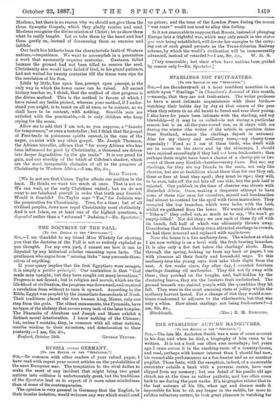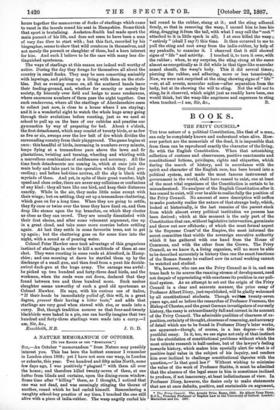THE STARLINGS' AUTUMN MANCEUVRES.
[To T117 EDITOR OF TUB SPECTATOB.".1 Sin,—The late Mr. Assheton-Smith was a man of some account in his day, and when he died, a biography of him came to be written. It is not a book one often sees nowadays ; but years ago I came across it in the smoking-room of a country-house, and read, perhaps with keener interest than I should feel now, his remarkable performances as a fox-hunter and as an amateur pugilist. These feats, with the exception, indeed, of a memorable encounter outside a bank with a perverse carter, have now slipped from my memory ; but one detail of his pacific old age struck me at the time as rather pathetic, and has often come back to me during the past weeks. His biographer relates that in the last autumn of his life, when age and disease made it impossible for him to sit any longer in the saddle, far more to subdue refractory carters, he took great pleasure in watching for
hears together the manmuvres of flocks of starlings which came to roost in the laurels round his seat in Hampshire. Some think that sport is brutalising. Assheton-Smith had made sport the main pursuit of his life, and does not seem to have been a man of very fine fibre to start with ; but this fact, recorded by his biographer, seems to show that wild creatures in themselves, and not merely the pursuit or slaughter of them, had a keen interest for him. And such I believe to be the ease with many less dis- tinguished sportsmen.
The ways of starlings at this season are indeed well worthy of notice. Daring the day they forage for themselves all about the country in small flocks. They may be seen consorting amicably with lapwings, and picking up a living with them on the stub- bles. But as evening comes on, all the scattered bands leave their feeding-ground, and, whether for security or merely for society, fly leisurely over field and hedge to some rendezvous, where enormous numbers of them pass the night together. One such rendezvous, where all the starlings of Aberdeenshire seem to collect just now, is close to a house where I am staying; and it is a wonderful sight to watch the whole huge army going through their evolutions before roosting, just as we used at school to pull up on the bars of our cubicles and practise our gymnastics by way of preparing for bed. About 4 o'clock, the first detachment, which may consist of twenty birds, or as few as five or six, swoops over the low belt of firs which divides the surrounding country from their playground. The game begins at once : this handful of birds, increasing in numbers every minute, keeps flying at a tremendous pace above the lawn and fir plantations, twisting and turning, wheeling and whirling with a marvellous combination of suddenness and accuracy. All the time fresh detachments are coming in, which at once join the main body and take part in the operation which they find pro- ceeding; and before bed-time arrives, all the sky is black with myriads of them. And yet, in spite of their great number, high speed and close order, there are never any collisions or confusions of any kind : they all tarn like one bird, and keep their distances exactly. While in the air, they make little noise except with their wings; but on settling, they set up a tremendous chattering, which goes on for a long time. When they are going to settle, they fly once or twice over the trees they have fixed on, and then drop like stones upon the top branches, on which they cluster as close as they can crowd. They are usually dissatisfied with their first choice, and after some vehement argument, rise up in a great cloud, and take some more exercise before settling again. At last they settle in some favourite trees, not to get up again ; but the chattering goes on for some time into the night, with a sound as of pouring water.
Colonel Peter Hawker once took advantage of this gregarious instinct of starlings in order to kill a multitude of them at one shot. They were roosting in some reeds at Alresford, in Hamp- shire; and one morning at dawn he startled them up by the discharge of a small gnu, and then fired from a punt his double- swivel duck-gun at the huge army. The carnage was awful he picked up two hundred and forty-three dead birds, and the workmen, when the reeds were cut down, declared that they found between two and three hundred more. Such useless slaughter seems unworthy of such a good old sportsman as Colonel Hawker. He says, with his curious use of italics, "If their heads be immediately pulled of this will, in a great degree, prevent their having a bitter taste," and adds that starlings are very good when stewed with rice, or made into a curry. Bat, though tradition assures ne that four-and-twenty blackbirds were baked in a pie, one can hardly imagine that two hundred and forty-three starlings were made into a curry.—I am, Sir, &c.,







































 Previous page
Previous page